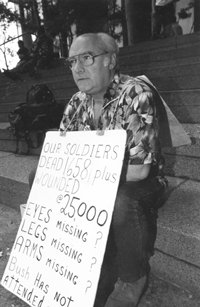By Claire F. Hamilton
“Honor the warrior, not the war,” read a sign carried by a small group of veterans Sunday at the Vietnam War Veterans Memorial on Water St. Veterans for Peace organized the Memorial Day weekend ceremony, which was partly a protest against the war in Iraq. It began with the placement of a wreath and moment of silence at the memorial, and concluded with a march to Battery Park, where flowers were tossed over the seawall to commemorate the dead. Speakers denounced what they characterized as an unjust and mismanaged war, and called for the withdrawal of troops from Iraq.
“Humvees were covered in plastic sheeting and unarmed…couldn’t be protected from artillery rounds and explosives,” said 22 year-old Alex Ryabov, a former marine who served in Iraq. Ryabov said that at the war’s onset, his artillery unit was under-equipped. Having seen the remains of people burned alive, Ryabov said he now suffers from post-traumatic stress disorder, a health issue others returned to in their speeches. “Bring the troops home now and take care of them when they get here,” Ryabov said.
Mark Kimmey, a lieutenant colonel formerly with the Civil Affairs Brigade and a Battery Park City resident, was assigned to minimize the impact of military operations on civilians in Iraq. He did not attend the ceremony Sunday, and disagrees with protesters who say U.S. troops should exit Iraq in the near future. But with firsthand knowledge of the military’s quagmire, he said, “One of the biggest problems we first ran into was an infrastructure of utilities really on its last legs. And nobody was prepared for a situation in which local government would basically evaporate.”
Carrying the flag on Sunday, Vietnam vet Hugh Bruce said that he feared health concerns would arise for troops in the next few years on account of inhalation of slightly radioactive material used in weaponry. “As for the Iraqis, it’s sitting in their backyard forever,” he said.
Besides the turmoil of active duty, veterans spoke out about being under-served when they return, in terms of education, employment, housing and health care. Possible service reductions at Manhattan’s V.A. hospital were a chief concern. “To put a uniform on and leave the comforts of home entitles us to the highest form of citizenship,” said Ricky Singh, who directs a homeless veteran reintegration program for the Black Veterans for Social Justice. But “300,000 veterans tonight will sleep in the streets homeless.”
Families of those who died or are currently serving in Iraq blamed the media for misrepresenting political motivations behind the Iraq invasion. Many alleged that the war was being fought purely out of economic interests. “For natural resources that don’t belong to us, 1,655 dead U.S. soldiers,” said Debbie Anderson, whose husband is serving in Iraq.
Protesters said they were acting on the principle that there are just and unjust wars. President of Veterans for Peace and Vietnam vet Dave Cline said, “I’m not a pacifist, and not saying that we always have to avoid war. The difference is purposes and who’s doing it. Iraq was a U.S. thing and the U.N. didn’t authorize it.”
There were many more stories to gather from the quieter veterans of Vietnam, Korea and W.W. II. Moe Fishman, 89, fought against fascists as a volunteer in the Spanish Civil War. He carried a banner for the “Veterans of the Abraham Lincoln Brigade,” so named for its first battle on Lincoln’s birthday, February 12, in 1937. Fishman got involved with the war after joining the Young Communist League when he lived in Astoria during the Depression. “They were fighting for radical concepts like social security and unemployment insurance,” he said. Believing that a policy of appeasement was inadequate to stop the spread of fascism, the then twenty-one year old Fishman went to Spain. “How could I not have gone when so much hung in the balance,” he said.
Fishman was hit by a dum-dum bullet and stranded near a riverbank until his comrades picked him up. “War is a terrible thing,” he said, “but I was fortunate in this regard. If you understand and believe in a just war, the trauma is very much reduced.”
WWW Downtown Express

































